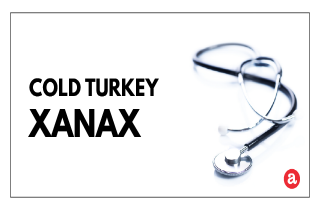Xanax (alprazolam) has a depressant effect on the body which accounts for its calming effects on the central nerves system. This allows for people who experience extreme anxiety or who suffer panic attacks to experience relief. However, when people use Xanax for weeks at a time, they can expect to develop a dependence to Xanax and withdraw from Xanax upon cessation of use.
What happens when you abruptly stop taking Xanax? Should you ever stop taking Xanax cold turkey? And how do you treat Xanax addiction if addiction is present? We review here and invite your questions about Xanax use, withdrawal from Xanax and helping Xanax addiction at the end.
Going cold turkey Xanax?
You may want to think again. In general, it’s best not to quit Xanax cold turkey. You can trigger withdrawal when you miss a dose or when you decide to stop taking Xanax. But, when you stop cold turkey the severity of symptoms increases depending on the level of built up dependency in the body. It’s for these reasons that it’s never recommended to decease Xanax dose by 50% at any given time. Here we look at what stopping Xanax cold turkey is like, what you can expect to experience, and what doctors recommended instead.
Cold turkey off Xanax
Why does going cold turkey off Xanax shock the system? When you stop Xanax cold turkey instead of a slow taper, you become vulnerable to the wide spectrum of alprazolam withdrawal symptoms and their severity. There is no way the body can regulate the sudden change to the chemicals in the central nervous system and the body goes into hyper drive trying to set your body back to its original setting. You can expect Xanax withdrawal to be uncomfortable and intense. But, it can be done if you hang in there and have the support necessary to help you.
Cold turkey Xanax withdrawal
When you stop Xanax, withdrawal symptoms manifest after the drug has worn off in your body. The onset of withdrawal symptoms should occurs 6-8 hours after the last dose has worn off maybe sooner if you have decided to suddenly stop taking Xanax . Because of the nature of Xanax withdrawal, withdrawal can take longer than withdrawal from opiate type medications. Withdrawal can fluctuate between severe and mild symptoms. At first, you feel like you have gone through the worst of it only to find acute symptoms returning. These kinds of “rebound symptoms” take longer to fully resolve. Withdrawal from Xanax usually peaks in intensity over the first 72 hours and should even out in about two weeks. Xanax withdrawal symptoms may include:
- convulsions
- cramps
- depression
- diarrhea
- fatigue
- headaches
- high blood pressure
- mania
- mood swings
- psychosis
- restlessness
- seizures
- spasms
- vomiting
Quitting Xanax cold turkey
Stopping Xanax cold turkey isn’t for everyone. In fact, cold turkey Xanax withdrawal can be an unncessarilygrueling process and it’s best to be in best optimal health. Other health concerns needs to be addressed and have a plan if you plan to stop Xanax cold turkey. Make sure that withdrawal won’t put your health in a compromising position. For those who are addicted and abusing Xanax, help may be necessary in order to make a cold turkey successful. Because Xanax works to treat anxiety, make sure that you have addressed other co-occurring mental health concerns. What makes withdrawal from Xanax difficult in the end is not the physical pain but the difficulty controlling mood swings.
Stopping Xanax cold turkey risks
When you stop taking Xanax cold turkey you increase the risk of negative withdrawal symptoms that can negatively impact your health. Not only can you experience extreme cold and flu-like symptoms, you will can also run the risk of going into a coma, seizures, and high blood pressure. These ricks can damage your body and land you in the hospital if you’re not careful.
Additionally, Xanax works on the chemistry in your brain that controls mood functioning. You may also experience rebound anxiety and with greater intensity. You can also become depressed and have suicidal thoughts which can further lead you to accidents of self-harm. When you stop Xanax cold turkey you also increase instances of relapse in order to control the severity of withdrawal.
Get off Xanax cold turkey
Instead of getting off Xanax cold turkey, it is recommended that you work with a doctor to slowly taper your dose of the Xanax and then continue to decreases it over time. This allows your body time to compensate for the decreasing amount of Xanax in the body. If tapering your doses is not an option the next recommendation would to seek out a detox or treatment facility. At these facilities, you will be supervised by professional medical help. Doctors, nurses, and clinicians can assist you in the withdrawal process and help with any complications as they arise. A medical Xanax detox also decreases the chances for relapse into Xanax use and keeps you safe if any psychological upset occur.
Can I quit Xanax cold turkey?
In general, it’s best not to quit Xanax cold turkey. You need to know that the process of xanax withdrawal is going to be uncomfortable and difficult. It will take time and support to withdraw successfully. Always talk to a doctor so you can find solution to help you to effectively quit Xanax.
More questions about xanax cold turkey
Do you still have questions about stopping Xanax cold turkey? Please provide your questions in the comments section below. We would also like to hear from people who have tried stopping Xanax cold turkey. Your experience is important to us and we try to respond to all comments personally and promptly.









Related Posts